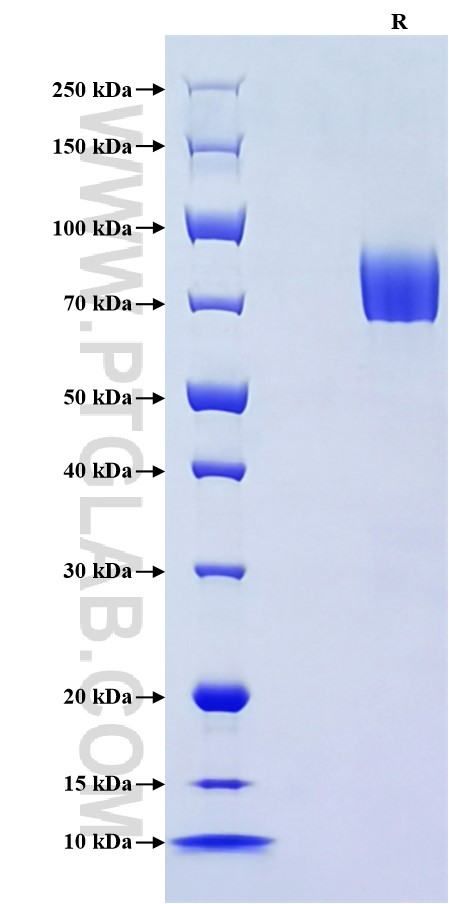Recombinant Human L-selectin/CD62L protein (rFc Tag)
种属
Human
纯度
>90 %, SDS-PAGE
标签
rFc Tag
生物活性
未测试
验证数据展示
产品信息
| 纯度 | >90 %, SDS-PAGE |
| 内毒素 | <0.1 EU/μg protein, LAL method |
| 生物活性 |
Not tested |
| 来源 | HEK293-derived Human L-selectin protein Trp39-Asn332 (Accession# P14151-1) with a rabbit IgG Fc tag at the C-terminus. |
| 基因ID | 6402 |
| 蛋白编号 | P14151-1 |
| 预测分子量 | 59.1 kDa |
| SDS-PAGE | 65-90 kDa, reducing (R) conditions |
| 组分 | Lyophilized from 0.22 μm filtered solution in PBS, pH 7.4. Normally 5% trehalose and 5% mannitol are added as protectants before lyophilization. |
| 复溶 | Briefly centrifuge the tube before opening. Reconstitute at 0.1-0.5 mg/mL in sterile water. |
| 储存条件 |
It is recommended that the protein be aliquoted for optimal storage. Avoid repeated freeze-thaw cycles.
|
| 运输条件 | The product is shipped at ambient temperature. Upon receipt, store it immediately at the recommended temperature. |
背景信息
CD62L, also known as L-selectin or SELL, is a member of the selectin family of adhesion molecules that also include CD62E (E-selectin) and CD62P (P-selectin). CD62L is a highly glycosylated protein of 95-105 kDa on neutrophils and 74 kDa on lymphocytes. CD62L is expressed on the surface of most leukocytes, including lymphocytes, neutrophils, monocytes, eosinophils, hematopoietic progenitor cells, and immature thymocytes. It mediates the binding of lymphocytes to high endothelial venules (HEV) of peripheral lymph nodes through interactions with a constitutively expressed ligand, and is also involved in lymphocyte, neutrophil, and monocyte attachment to endothelium at sites of inflammation.
参考文献:
1.Bowen BR. et al. (1989) J Cell Biol. 109(1):421-427. 2.Tedder TF. et al. (1989) J Exp Med. 170(1):123-133. 3.Griffin JD. et al. (1990) J Immunol. 145(2):576-584. 4.Tedder TF. et al. (1990) Eur J Immunol. 20(6):1351-1355. 5.Tedder TF. et al. (1990) J Immunol. 144(2):532-540. 6.Schleiffenbaum B. et al. (1992) J Cell Biol. 119(1):229-238.


